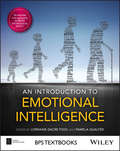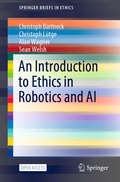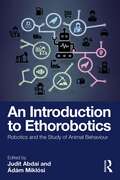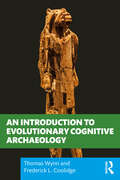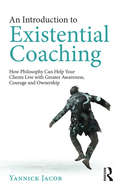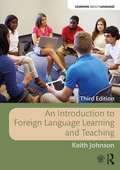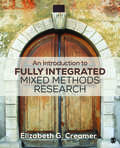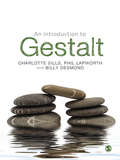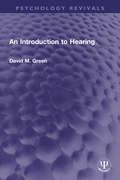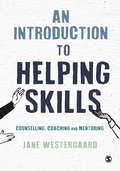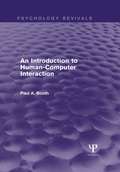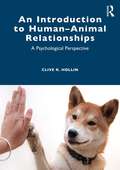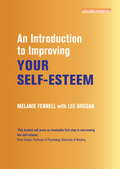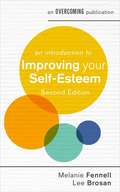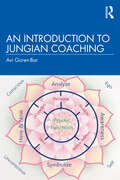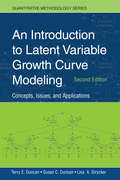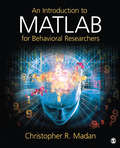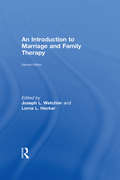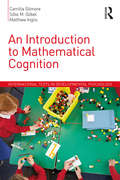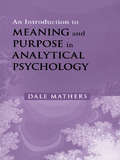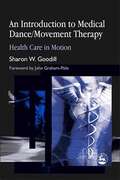- Table View
- List View
An Introduction to Emotional Intelligence (BPS Textbooks in Psychology)
by Lorraine Dacre Pool Pamela QualterBridges the gap between the scholarly literature and “pop-psych” books on EI Emotional Intelligence (EI) has become a topic of vast and growing interest worldwide and is concerned with the ways in which we perceive, identify, understand, and manage emotions. It is an aspect of individual difference that can impact a number of important outcomes throughout a person’s lifespan. Yet, until now there were no authoritative books that bridge the gap between scholarly articles on the subject, often published in obscure professional journals, and the kind of books found in the “pop-psych” sections of most large bookstores. This book fills that gap, addressing the key issues from birth through to old age, including the impact of EI on child development, social relationships, the workplace, and health. It is a useful introduction to the academic study of EI, including its history as a concept. Featuring contributions by an international team of EI researchers, this thought provoking and informative book offers students, educators, mental health professionals, and general readers a comprehensive, critical, and accessible introduction to state-of-the-art EI theory and research. From the historical origins of EI to its contemporary applications across an array of domains, An Introduction to Emotional Intelligence explores what the research evidence tells us about it, why it is important, and how it is measured. Throughout each chapter any potentially tricky words or concepts are highlighted and explained. And, most chapters feature activities to spur further reflection on the subject matter covered as well as ideas on how to apply aspects of EI to various questions or problems arising in the readers’ lives. Features contributions from expert authors from around the world with experience of researching and teaching EI theory and practice Makes EI concepts, foundations, research, and theory accessible to a wider audience of readers than ever before Explores EI’s roots in psychological thinking dating back to early 20th century and considers the reasons for its widespread popularity in contemporary times Reviews the latest research into the constructs of ability EI and trait EI and their validity in relation to health, wellbeing, social relationships, academic, and work performance An Introduction to Emotional Intelligence is fascinating and informative reading and a source of practical insight for students of psychology, management and leadership, education, social work and healthcare, and those working in education, health settings and in psychological counseling professions.
An Introduction to Ethics in Robotics and AI (SpringerBriefs in Ethics)
by Alan Wagner Christoph Lütge Sean Welsh Christoph BartneckThis open access book introduces the reader to the foundations of AI and ethics. It discusses issues of trust, responsibility, liability, privacy and risk. It focuses on the interaction between people and the AI systems and Robotics they use. Designed to be accessible for a broad audience, reading this book does not require prerequisite technical, legal or philosophical expertise. Throughout, the authors use examples to illustrate the issues at hand and conclude the book with a discussion on the application areas of AI and Robotics, in particular autonomous vehicles, automatic weapon systems and biased algorithms. A list of questions and further readings is also included for students willing to explore the topic further.
An Introduction to Ethorobotics: Robotics and the Study of Animal Behaviour
by Ádám Miklósi Judit AbdaiThis pioneering text explores the emerging discipline of ethorobotics which brings together the fields of animal behaviour and robotics. It encourages closer collaboration between behavioural scientists and engineers to facilitate the creation of robots with a higher degree of functionality in animal/human environments and to broaden understanding of animal behaviour in new and intriguing ways.Utilising the knowledge of key ethologists and roboticists in the field today, this book is divided into four major parts. The first part is written for those with little or no background in the biology of animal behaviour, particularly for those coming from an engineering background seeking an accessible introduction to the field and how it can be applied to robotic behaviour. Topics include problem solving in animals, social cognition, and communication (visual, acoustic, olfactory, etc.). The second part is an introduction to the basic construction of robots for non‑engineers, and the possibilities offered by current technical achievements and their limitations to the study of animal behaviour. The third part explores the core theme of ethorobotics, the basic framework of the discipline, the field’s evolution, and current topics including ethical considerations, autonomy, to ‘living’ social robots. The fourth and final chapter looks at ethorobotics in practice through key research projects which have had the biggest impact.This is a ground‑breaking interdisciplinary text which will appeal to upper‑level undergraduates, postgraduates, and researchers focusing on animal behaviour and cognition, as well as those undertaking courses in engineering, social robotics, biologically inspired robotics, AI, and human–robot and animal–robot interactions.
An Introduction to Evolutionary Cognitive Archaeology
by Thomas Wynn Frederick L. CoolidgeAn Introduction to Evolutionary Cognitive Archaeology is the first concise introduction that lays out the epistemological foundations of evolutionary cognitive archaeology in a way that is accessible to students. The volume is divided into three sections. The first section situates cognitive archaeology in the pantheon of archaeological approaches and distinguishes between ideational cognitive archaeology and evolutionary cognitive archaeology. This is followed by a close look at the nature of cognitive archaeological inferences and concludes with brief summaries of the major methods of evolutionary cognitive archaeology. The second section of the book introduces the reader to a variety of cognitive phenomena that are accessible using the methods of cognitive archaeology: memory, technical cognition, spatial cognition, social cognition, art and aesthetics, and symbolism and language. The third section presents a brief outline of hominin cognitive evolution from the perspective of evolutionary cognitive archaeology. The authors divide the archaeological record into three major phases: The Bipedal Apes—3.3 million-1.7 million years ago; The Axe Age—1.7 million-300,000 years ago; and The Emergence of Modern Thinking—300,000–12,000 years ago. An Introduction to Evolutionary Cognitive Archaeology is an essential text for undergraduate students, graduate students, and scholars across the behavioral and social sciences interested in learning about cognitive archaeology, including psychologists, philosophers, anthropologists, and archaeologists.
An Introduction to Existential Coaching: How Philosophy Can Help Your Clients Live with Greater Awareness, Courage and Ownership
by Yannick JacobIn An Introduction to Existential Coaching Yannick Jacob provides an accessible and practical overview of existential thought and its value for coaches and clients. Jacob begins with an introduction to coaching as a powerful tool for change, growth, understanding and transformation before exploring existential philosophy and how it may be integrated into coaching practice. The book goes on to examine key themes in existentialism and how they show up in the coaching space, including practical models as well as their application to organisations and leadership. Jacob concludes by evaluating ethical dimensions of working existentially and offers guidance on how to establish an existential coaching practice, including how to gain clients and build relationships with strategic partners. With reflective questions, exercises, interventions and activities throughout, An Introduction to Existential Coaching will be invaluable for anyone wanting to live and work at greater depth or to succeed as an existential coach. Accessibly written and with a wide selection of references and resources, An Introduction to Existential Coaching is a vital guide for coaches in training as well as an inspiring addition to the repertoir of experienced practitioners. It serves academics and students to understand existential philosophy and allows professionals with coaching responsibilities to access more meaningful conversations.
An Introduction to Foreign Language Learning and Teaching
by Keith JohnsonAn Introduction to Foreign Language Learning and Teaching presents an engaging, student-friendly guide to the fields of foreign language learning and teaching. For students beginning their study of these fields, the book provides essential background information, dealing with language learning and teaching in a clear and comprehensible way. An Introduction will also be of value to teachers in training and those already working in the field, providing an up-to-date overview which focuses on contemporary issues while at the same time providing an important historical perspective. The book covers both theoretical and practical aspects of the field and provides suggestions throughout for discussion and workshop activities. Matters related to classroom and task-based teaching are dealt with at length, making the book suitable for use on practical training courses, especially where a degree of theoretical background is also required. Although most of the examples used deal with English as a foreign language, the book offers a suitable introduction for teachers of any foreign language. In this age of unfettered global communication the teaching and learning of foreign languages have never been more important. An Introduction to Foreign Language Teaching and Learning will give you the head start you need to get ahead of the field.
An Introduction to Fully Integrated Mixed Methods Research
by Elizabeth G. CreamerThis practical book provides the tools needed to design, execute, and evaluate fully integrated mixed methods research studies. A uniting metaphor of the architectural arch helps students understand the benefits of a mixed methods approach as they consider ways to integrate the qualitative and quantitative strands at all stages of design and execution. With use of examples from popular media and published research, this text also includes a detailed discussion of ways to accomplish mixing methods during data collection and analysis and a separate chapter on designing and executing a realistic mixed methods dissertation.
An Introduction to Fully Integrated Mixed Methods Research
by Elizabeth G. CreamerThis practical book provides the tools needed to design, execute, and evaluate fully integrated mixed methods research studies. A uniting metaphor of the architectural arch helps students understand the benefits of a mixed methods approach as they consider ways to integrate the qualitative and quantitative strands at all stages of design and execution. With use of examples from popular media and published research, this text also includes a detailed discussion of ways to accomplish mixing methods during data collection and analysis and a separate chapter on designing and executing a realistic mixed methods dissertation.
An Introduction to Gestalt
by Charlotte Sills Mr Phil Lapworth Billy DesmondThis thoroughly revised edition of Gestalt Counselling introduces the fundamental concepts of Gestalt and systematically demonstrates how to apply and use these in practice. Taking a relational perspective, the expert authors explore how Gestalt can be used in a wide variety of 'helping conversations' from counselling, psychotherapy and coaching to mentoring, managing, consulting and guiding. A Each chapter contains case examples from the therapeutic world and a 'running case study' featuring ongoing coaching work moves throughout the book, with diagrams and lists for further reading making this the ideal text for use in training. The accessible, engaging writing style will appeal to undergraduates and postgraduates alike. Charlotte Sills is a practitioner and supervisor in private practice, a tutor at Metanoia Institute and a tutor and supervisor of coaching at Ashridge CollegeBusiness School. She is the author or co-author of many books and articles on therapeutic work. Phil Lapworth is a counsellor, psychotherapist and supervisor in private practice near Bath and has written extensively in the field of counselling and psychotherapy. Billy Desmond is a Gestalt psychotherapist, executive coach and organisational development consultant. He is a member of Ashridge College and a Programme Director of Partnering and Consulting in ChangeHead of the Gestalt Department at Metanoia Insititute, and tutor and consultant at Ashridge Business School.
An Introduction to Hearing (Psychology Revivals)
by David M. GreenOriginally published in 1976, this introduction to hearing was intended to provide a sufficient introduction to each of several subareas of hearing so that the serious student can read the more advanced treatments with greater appreciation and understanding. It was intended for upper graduate and graduate students. It assumes some mathematical sophistication – calculus for example, but there is some review of more basic concepts, such as logarithms. There is also a brief treatment of the necessary material from the different disciplines – physics, physiology, psychology, anatomy and mathematics – that a student of hearing will need to know.
An Introduction to Helping Skills: Counselling, Coaching and Mentoring
by Jane WestergaardReaders will be introduced to the three core approaches of counselling, coaching and mentoring, and shown how they work across a variety of settings, including therapy, teaching, social work and nursing. Part 1 takes readers through the theory, approaches and skills needed for helping work, and includes chapters on: The differences and similarities of counselling, coaching and mentoring Foundational and advanced skills for effective helping Supervision and reflective practice Ethical helping and working with diversity Part 2 shows how helping skills look in practice, in a variety of different helping professions. 10 specially-written case studies show you the intricacies of different settings and client groups, including work in schools, hospitals, telephone helplines and probation programs.
An Introduction to Helping Skills: Counselling, Coaching and Mentoring
by Jane WestergaardReaders will be introduced to the three core approaches of counselling, coaching and mentoring, and shown how they work across a variety of settings, including therapy, teaching, social work and nursing. Part 1 takes readers through the theory, approaches and skills needed for helping work, and includes chapters on: The differences and similarities of counselling, coaching and mentoring Foundational and advanced skills for effective helping Supervision and reflective practice Ethical helping and working with diversity Part 2 shows how helping skills look in practice, in a variety of different helping professions. 10 specially-written case studies show you the intricacies of different settings and client groups, including work in schools, hospitals, telephone helplines and probation programs.
An Introduction to Human-Computer Interaction (Psychology Revivals)
by Paul BoothOriginally published in 1989 this title provided a comprehensive and authoritative introduction to the burgeoning discipline of human-computer interaction for students, academics, and those from industry who wished to know more about the subject. Assuming very little knowledge, the book provides an overview of the diverse research areas that were at the time only gradually building into a coherent and well-structured field. It aims to explain the underlying causes of the cognitive, social and organizational problems typically encountered when computer systems are introduced. It is clear and concise, whilst avoiding the oversimplification of important issues and ideas.
An Introduction to Human–Animal Relationships: A Psychological Perspective
by Clive R. HollinAn Introduction to Human–Animal Relationships is a comprehensive introduction to the field of human–animal interaction from a psychological perspective across a wide range of themes. Hollin examines the topic of the relationships between humans and animals as seen in owning a companion animal alongside more indirect relationships such as our approaches to eating meat. The core issues under discussion include the moral and ethical issues raised in using animals for entertainment, in therapy, to keep us safe, and in sports such as horse racing. The justifications for hunting and killing animals as sport and using animals in scientific experimentation are considered. The closing chapter looks to the future and considers how conservation and climate change may influence human–animal relationships. This key text brings an important perspective to the field of human–animal studies and will be useful to students and scholars in the fields of psychology, sociology, animal welfare, anthrozoology, veterinary science, and zoology.
An Introduction to Improving Your Self-Esteem
by Leonora Brosan Dr Melanie FennellA new addition to the popular Introduction to Coping with series of CBT-based self-help booklets. Written by the author of the bestselling Overcoming Low Self-Esteem and the popular self-help title Overcoming Stress, An Introduction to Coping with Low Self-Esteem offers expert advice to anyone struggling with self-confidence. Includes helpful information on what causes and maintains low self-esteem and proven CBT strategies to beat it.
An Introduction to Improving Your Self-Esteem, 2nd Edition
by Melanie Fennell Leonora BrosanLow self-esteem can impact on many areas of your life such as your relationships, work life and general wellbeing. This invaluable self-help guide will help you to understand what has led to your poor self-esteem, what keeps it going and how to improve your self-image, gaining a more balanced and positive view of yourself. This self-help guide is based on clinically proven cognitive behavioural therapy (CBT) techniques to help you improve your confidence. You will learn:- How low self-esteem develops- How to challenge negative predictions- How to improve self-acceptance
An Introduction to Improving Your Self-Esteem, 2nd Edition (An Introduction to Coping series)
by Leonora Brosan Dr Melanie FennellLow self-esteem can impact on many areas of your life such as your relationships, work life and general wellbeing. This invaluable self-help guide will help you to understand what has led to your poor self-esteem, what keeps it going and how to improve your self-image, gaining a more balanced and positive view of yourself. This self-help guide is based on clinically proven cognitive behavioural therapy (CBT) techniques to help you improve your confidence. You will learn:- How low self-esteem develops- How to challenge negative predictions- How to improve self-acceptance
An Introduction to Improving Your Self-Esteem, 2nd Edition (Overcoming Ser.)
by Melanie Fennell Leonora BrosanOvercoming app now available.This is a new addition to the popular Introduction to Coping with series of CBT-based self-help booklets. Written by the author of the bestselling Overcoming Low Self-Esteem and the popular self-help title Overcoming Stress, An Introduction to Coping with Low Self-Esteem offers expert advice to anyone struggling with self-confidence. Includes helpful information on what causes and maintains low self-esteem and proven CBT strategies to beat it.
An Introduction to Jungian Coaching
by Avi Goren-BarBased on the psychology of Carl Jung, this illuminating new book invites coaches to extend their toolbox with deep, creative, and efficient professional methods that derive from a new perspective on coaching. In using the unconscious archetypes as a practical active psychological database for change, the Jungian coach can contribute significant modification in the coachee’s expected behavior. Jungian Coaching can be applied in evaluating the coachee, the team, and the corporation. This book translates Jungian psychology into simple comprehensive concepts. Each chapter translates theoretical concepts and rationale to thepractice of coaching. Illustrated with practical examples from the corporate world and life coaching, it offers Jungian Coaching tools and techniques. By integrating the Gestalt psychology principle of the "here and now" into Jungian concepts, the author develops a new coaching tool that enables an activation of archetypes as a useful and empowering coaching experience. A valuable introductory resource for all those involved in coaching relationships, this book can empower coachees and serve as a compass for personal growth. It will be of great interest to practicing coaches, executives, human resource managers, consultants, and psychotherapists.
An Introduction to Latent Variable Growth Curve Modeling: Concepts, Issues, and Application, Second Edition (Quantitative Methodology Series)
by Terry E. Duncan Susan C. Duncan Lisa A. StryckerThis book provides a comprehensive introduction to latent variable growth curve modeling (LGM) for analyzing repeated measures. It presents the statistical basis for LGM and its various methodological extensions, including a number of practical examples of its use. It is designed to take advantage of the reader’s familiarity with analysis of variance and structural equation modeling (SEM) in introducing LGM techniques. Sample data, syntax, input and output, are provided for EQS, Amos, LISREL, and Mplus on the book’s CD. Throughout the book, the authors present a variety of LGM techniques that are useful for many different research designs, and numerous figures provide helpful diagrams of the examples. Updated throughout, the second edition features three new chapters—growth modeling with ordered categorical variables, growth mixture modeling, and pooled interrupted time series LGM approaches. Following a new organization, the book now covers the development of the LGM, followed by chapters on multiple-group issues (analyzing growth in multiple populations, accelerated designs, and multi-level longitudinal approaches), and then special topics such as missing data models, LGM power and Monte Carlo estimation, and latent growth interaction models. The model specifications previously included in the appendices are now available on the CD so the reader can more easily adapt the models to their own research. This practical guide is ideal for a wide range of social and behavioral researchers interested in the measurement of change over time, including social, developmental, organizational, educational, consumer, personality and clinical psychologists, sociologists, and quantitative methodologists, as well as for a text on latent variable growth curve modeling or as a supplement for a course on multivariate statistics. A prerequisite of graduate level statistics is recommended.
An Introduction to MATLAB for Behavioral Researchers
by Christopher R. MadanMATLAB is a powerful data analysis program, but many behavioral science researchers find it too daunting to learn and use. An Introduction to MATLAB for Behavioral Researchers by Christopher R. Madan is an easy-to-understand, hands-on guide for behavioral researchers who have no prior programming experience. Written in a conversational and non-intimidating style, the author walks students—step by step—through analyzing real experimental data. Topics covered include the basics of programming, the implementation of simple behavioral analyses, and how to make publication-ready figures. More advanced topics such as pseudo-randomization of trial sequences to meet specified criteria and working with psycholinguistic data are also covered. Interesting behavioral science examples and datasets from published studies, such as visualizing fixation patterns in eye-tracking studies and animal search behavior in two-dimensional space, help develop an intuition for data analysis, which is essential and can only be developed when working with real research problems and real data.
An Introduction to Marriage and Family Therapy
by Joseph L. Wetchler Lorna L. HeckerNow in its second edition, this text introduces readers to the rich history and practice of Marriage and Family Therapy, with 32 professionals from across the US presenting their knowledge in their areas of expertise. This blend of approaches and styles gives this text a unique voice and makes it a comprehensive resource for graduate students taking their first course in Marriage and Family Therapy. The book is divided into three sections: Part 1 focuses on the components on which 21st century family therapy is based and summarizes the most recent changes made to not only therapeutic interventions, but to the very concept of "family." Part 2 presents an overview of the 7 major theoretical models of the field: structural, strategic, Milan, social constructionist, experiential, transgenerational, and cognitive-behavioral family therapy. Each chapter in this section * Focuses on the founder of the theory, its theoretical tenants, and its key techniques* Shows how the model focuses on diversity* Presents the research that supports the approach Part 3 addresses specific treatment areas that are common to marriage and family therapists, such as sex therapy, pre-marital therapy, research, and ethics and legal issues. As an introduction to the field of Marriage and Family Therapy, this volume stands above the rest. Not only will readers gain an understanding of the rich history of the field and its techniques, but they will also see a complete picture of the context in which families are embedded, such as gender, culture, spirituality, and sexual orientation. This knowledge is the key to understanding what differentiates Marriage and Family Therapy from individual psychotherapy. Glossaries, case studies, tables, figures, and appendices appear generously throughout the text to present this information and give students a thorough overview to prepare them for their professional lives.
An Introduction to Mathematical Cognition (International Texts in Developmental Psychology)
by Camilla Gilmore Silke M. Göbel Matthew InglisThe last decade has seen a rapid growth in our understanding of the cognitive systems that underlie mathematical learning and performance, and an increased recognition of the importance of this topic. This book showcases international research on the most important cognitive issues that affect mathematical performance across a wide age range, from early childhood to adulthood. The book considers the foundational competencies of nonsymbolic and symbolic number processing before discussing arithmetic, conceptual understanding, individual differences and dyscalculia, algebra, number systems, reasoning and higher-level mathematics such as formal proof. Drawing on diverse methodology from behavioural experiments to brain imaging, each chapter discusses key theories and empirical findings and introduces key tasks used by researchers. The final chapter discusses challenges facing the future development of the field of mathematical cognition and reviews a set of open questions that mathematical cognition researchers should address to move the field forward. This book is ideal for undergraduate or graduate students of psychology, education, cognitive sciences, cognitive neuroscience and other academic and clinical audiences including mathematics educators and educational psychologists.
An Introduction to Meaning and Purpose in Analytical Psychology
by Dale MathersThis highly original book examines the relationship between analytical psychology and meaning, interpreting human suffering as arising from meaning disorders. Using clinical examples - whether people trapped in patterns of dependence, suffering from psychosomatic diseases, or with personality problems - it shows how, by treating clients' issues as failures of the meaning-making process, one can help them change their own own personal meaning. An Introduction to Meaning and Purpose in Analytical Psychology will make provocative reading for all those in helping professions, including counsellors, psychotherapists, and psychiatrists.
An Introduction to Medical Dance/Movement Therapy: Health Care in Motion
by Sharon W. GoodillPresenting dance/movement therapy (DMT) as a viable and valuable psychosocial support service for those with a medical illness, Sharon W. Goodill shows how working creatively with the mind/body connection can encourage and enhance the healing process. This book represents the first attempt to compile, synthesize, and publish the work that has been done over recent years in medical DMT. The emerging application of medical DMT is grounded within the context of established viewpoints and theories, such as arts therapies, health psychology and scientific perspectives. As well as examining its theoretical foundations, the author offers real-life examples of medical DMT working with people of different ages with different medical conditions. This comprehensive book provides a firm foundation for exploration and practice in medical DMT, including recommendations for professional preparation, research and program development. Interviews with dance/movement therapists bring fresh and exciting perspectives to the field and these and the author's testimonies point to the possible future applications of medical DMT. With an increasing number of professional dance/movement therapists working with the medically ill and their families, this is a timely and well-grounded look at an exciting new discipline. It is recommended reading for DMT students and professionals, complementary therapists, and all those with an interest in the healing potential of working innovatively with the mind and body.
